Four Texas kittens nicknamed the 'G Litter' are ready for loving homes
Texas kittens are a 'spirited, curious' bunch, according to shelter
An adorable group of nearly identical orange tabby kittens is available for adoption in Houston, Texas.
The group, which has been nicknamed the "G Litter," consists of kittens Gregory, Gus, Georgie and Ginger. They are estimated to be 8 weeks old, the Best Friends Animal Society, headquartered in Utah, told Fox News Digital.
Three male kittens and one female kitten make up this cute quartet.
 NEW YORK-BASED KITTY WITH A CUTE PINK NOSE NEEDS A LOVING HOME
NEW YORK-BASED KITTY WITH A CUTE PINK NOSE NEEDS A LOVING HOMEDespite their young age, they have already traveled quite a long way. The foursome originated in Brownsville, Texas.
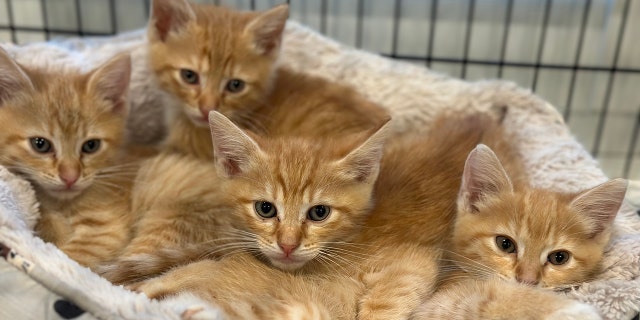
The four kittens in the "G Litter" are nearly identical. (Best Friends Animal Society)
"They are a very spirited, curious bunch," according to the Best Friends Animal Society.
"They are almost identical."
Typical of most kittens, the group "loves to explore and practice their climbing and pouncing skills," the shelter said.
ANIMAL SHELTER STAFF RESORTS TO DRAWING PICTURES OF PETS AFTER CAMERA 'BREAKS': 'THIRD DIMENSION IS OVERRATED'
They also like "basking and purring in the sun-filled windowsill."
 The G Litter is ready for adoption, and anyone interested in taking home one (or more) of these kittens can email HoustonAdoption@bestfriends.org.
The G Litter is ready for adoption, and anyone interested in taking home one (or more) of these kittens can email HoustonAdoption@bestfriends.org. 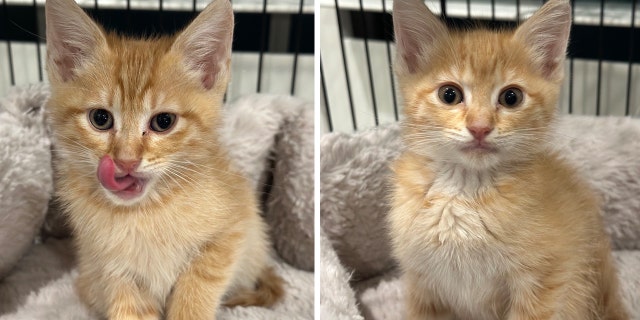
Georgie (left) and Ginger (right) are two of the four orange kittens in the "G Litter." They are up for adoption in Houston. (Best Friends Animal Society)
Orange females like Ginger are relatively uncommon. About 80% of orange cats are male, cat educator and internet personality Hannah Shaw said in a YouTube video.
This is because the color of a cat's fur is determined by its genes — specifically, its X chromosome.
10 ADORABLE PUPPIES DUMPED ON SIDE OF ROAD IN GEORGIA LOOKING FOR FOREVER HOMES
Shaw, who known on YouTube as "The Kitten Lady," explained the gene for fur color is carried by the X chromosome.
This gene is either for black or orange fur.
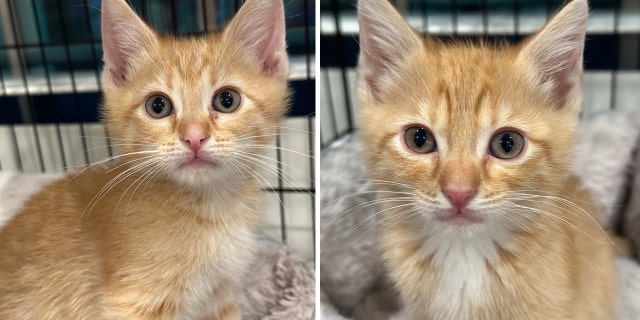
Gregory (left) and Gus (right) round out the "G Litter" of orange kittens. (Best Friends Animal Society)
As male cats receive only one X chromosome from their parents, they will be orange if their X chromosome has the gene for orange fur or black if their X chromosome has the gene for black fur. A female orange kitten would have received orange X chromosomes from both parents.
 Conversely, nearly all calico cats, a mixture of orange, black and white, are female, as they received one X chromosome with orange fur genes and one with black fur genes.
Conversely, nearly all calico cats, a mixture of orange, black and white, are female, as they received one X chromosome with orange fur genes and one with black fur genes. CAT IN NEW YORK CITY NAMED ELIJAH IS A 'TOTAL SWEETHEART,' NEEDS A FAMILY TO LOVE HIM
Male calico cats are rare, and they all have a genetic abnormality with two X chromosomes in addition to a Y chromosome, said Shaw.
Summer is often a particularly crowded and busy time for animal shelters, the Best Friends Animal Society told Fox News Digital. Cats in particular are at risk of being euthanized at shelters due to overpopulation.
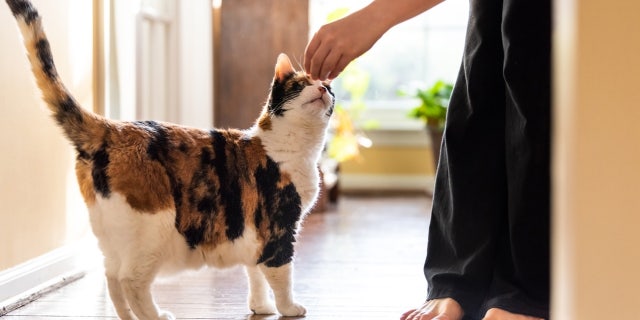
Calico cats, which have orange and black fur, are nearly always female with rare exceptions, says YouTube personality Hannah Shaw. (iStock)
"While dogs and cats entered shelters at about an equal rate, cats made up 55% of the killing, and dogs were 45%," according to the Best Friends Animal Society.
CLICK HERE TO SIGN UP FOR OUR LIFESTYLE NEWSLETTER
"Cats remain the most vulnerable in shelters, especially during ‘kitten season,’ the summer months when cats reproduce and kittens flood shelters."
 In its annual report released May 31, Best Friends found 57% of shelters in the United States are "no-kill," an increase from 24% in 2016.
In its annual report released May 31, Best Friends found 57% of shelters in the United States are "no-kill," an increase from 24% in 2016.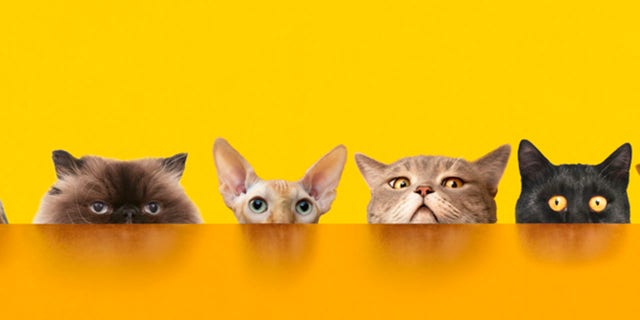
Cats are at risk of being killed in shelters due to overpopulation, according to Best Friends Animal Society, headquartered in Utah. (iStock)
A shelter is considered "no-kill" if it has a save rate of over 90%. About 10% of pets who enter shelters may need human euthanasia due to behavorial or medical problems, according to Best Friends.
Best Friends has a goal of making the United States "no-kill" by 2025.
"We are at the tipping point of taking the country no-kill," Julie Castle, CEO of Best Friends, said in a news release.
"This critical mass of no-kill shelters shows that it’s possible to save every healthy and treatable pet in a shelter, and it’s sustainable. Ninety-three percent of shelters that were no-kill in 2021 were able to maintain it the following year."
No comments: